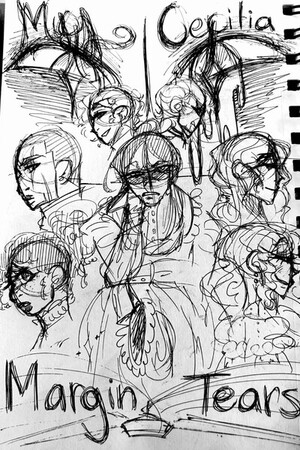Chapter 28:
Fable Origins
Margin Tears: My Cecilia
Another day blurred past. If anyone noticed her detachment, it was not addressed, not so long as her chores were completed and complaints were not raised. Even Dmitri and Lord Olrin were a lesser presence since the bathtub incident. Maybe they, too, saw her quieted attitude a signal of progress rather than a concern. Rather than distracted and detached, perhaps she was being perceived as driven and determined. Perhaps she saw it that way, too.
That night, she pressed the book for more. Over their time, it lessened its resistance, readily offering its contents wither deciphering. The cipher fell away as though it had grown weary of keeping secrets. What she found was not instruction, but a tale.
…
It spoke of a man, a man not unlike so many she had dusted around, bowed before, served in silence. He was of the upper class, but not admired. His wealth was modest, his name uninspiring. He moved through salons and drawing rooms unnoticed, despised only by those who bothered to remember him at all.
And then he found this book.
He read its plain offer, the same blade laid upon the table that she had herself turned away from. He, however, grasped it eagerly. Greed, perhaps, was the only true passion he had ever known.
At first, it seemed to be a miracle. Coin gathered at his feet. His ventures succeeded while his rivals stumbled. Invitations arrived from doors once barred to him. His voice carried weight, and soon enough, entire rooms bent themselves toward his words.
But with omnipresent, dispassionate perspective, the book described how his hunger deepened. Wealth was not enough, nor was station, nor was influence. He sought more—To be adored, to be feared, to be infinite.
And so, he continued to draw upon what the book offered, never questioning, never resisting, instead leaning fully into the power presented for him—Until, at last, he was no longer a man. His body hollowed into shadow, his face became a smear across memory. Those who once obeyed him forgot him the instant they turned away. He was present only in whispers, in compulsions, in sudden urges that guided hands not his own.
He still lingers. Trapped. Bound not by chains, but by his own bargain. He has no tongue of his own, only the voice of the book through which to speak. He has no hands, but he calls others in want for change to open its pages.
...
Cecilia could not say with her full chest whether this was history or parable, if it was meant to teach a lesson or to warn of mistakes repeating. Yet as she closed the book, a chill crept deep into her bones.
Though the room was empty, Cecilia swore she heard another breath beside hers.
Was he still there, peering at her through the letters? Was that what waited for anyone who accepted the book’s offering?
Then the thought struck her, like a sudden draft through a closed window—What if the fabled man was not merely a ghostly cautionary tale, but someone she knew?
Once the idea appeared, Cecilia could not shake it. The lord of Sisyphus—His presence was heavy yet strangely vacant. He commanded attention, yet when she searched her memory, she cannot recall the details of his face for long, only generic adjectives constructing a concept of beauty. His words echoed beyond themselves as though they did not end when spoken, instead continuing to pull at her enough to shape her thoughts long after he had gone.
And then there was the narrator. That unseen hand guiding, prodding, constraining her steps. She had felt mocked by it, trapped in its insistence that she must play the maid, the vulnerable figure in some cruel romance. Its voice coiled around sorry excuses of choice, dressing them in inevitability.
What if they were not separate?
The book told of the man who succumbed becoming a hollow thing, a being that could speak only through the book itself—through influence, through story, through compulsion. The lord, with his peculiar gravity, his uncanny distance from the world of real men…Could he be the very same? Could the narrator that hemmed her in, dictating what she was permitted to be, be none other than him, the greedy soul who bargained away his humanity?
His reach without motion, his power without effort, his gaze that followed her even when his eyes were turned—It explained too much. If the lord and the narrator were indeed one, then she was not just resisting a literary device, but the will of a man long ago lost to the book’s hunger, to his own unrestrained sins.
The thought chilled her more than the tale itself. For if it was true, then she was not merely a character imprisoned in a tale—She was prey, drawn into the lingering grasp of something that devoured its lord and now wore his mask. She was leashed, tethered to a being no longer constrained by the limits of humanity, yet was free to consume its human lusts with no earthly limit.
She could not sleep, would not even if her body and mind would allow it. It was an insomnia birthed from a blaze of fear and rage intertwined.
If he believed her no more than a line in his story, a servant in his endless game, then he underestimated her.




Please sign in to leave a comment.